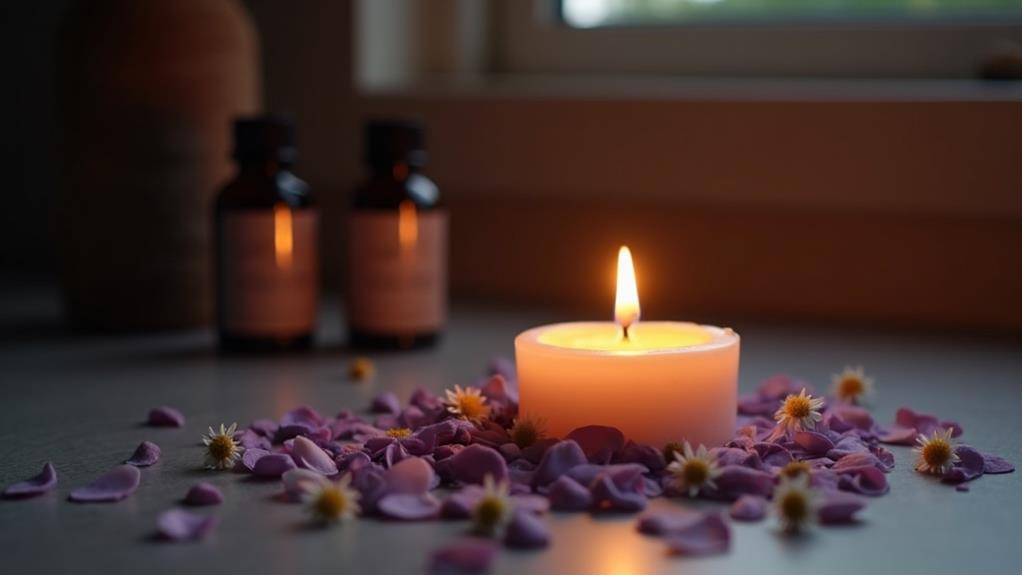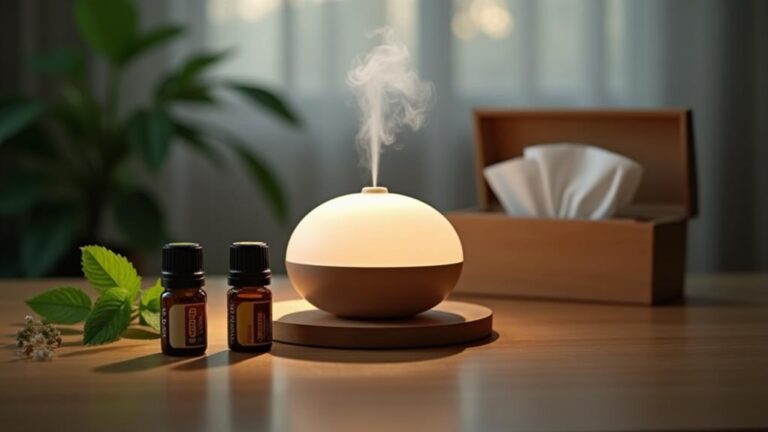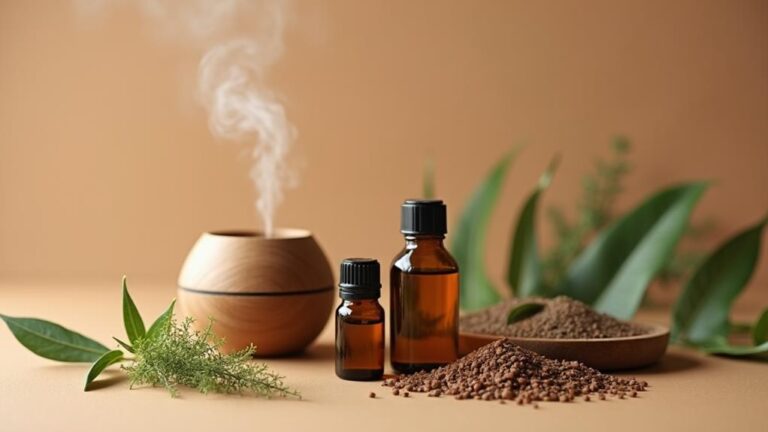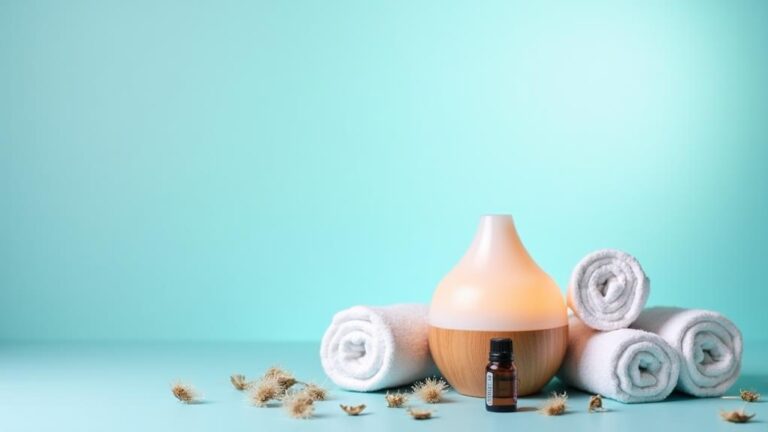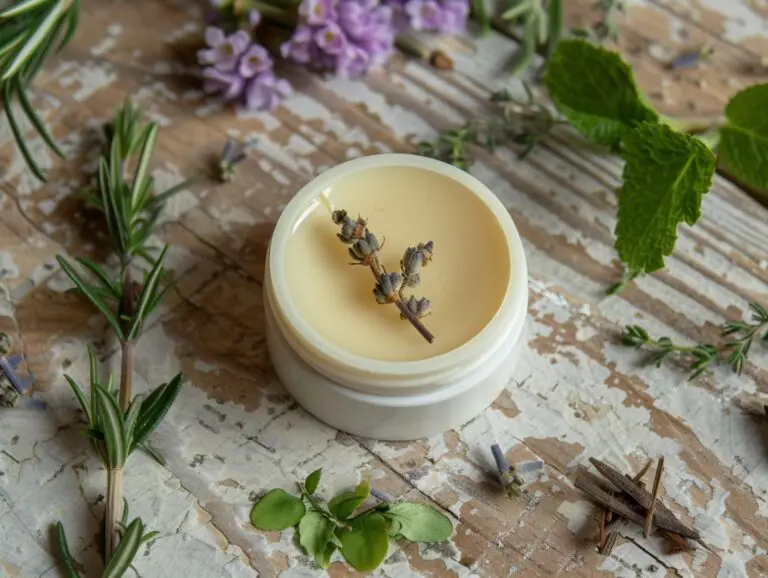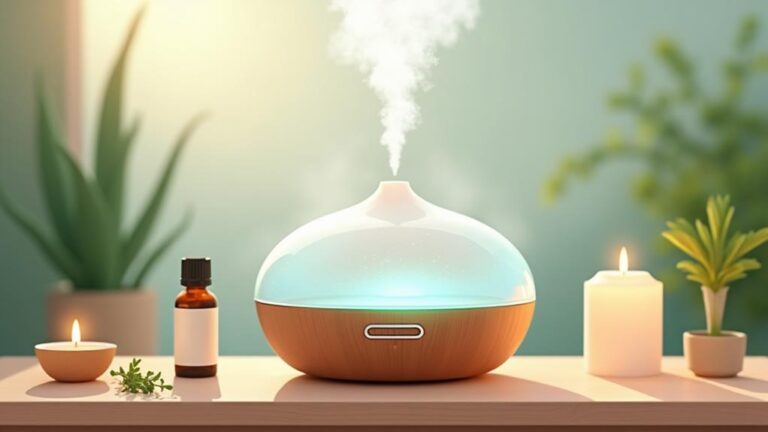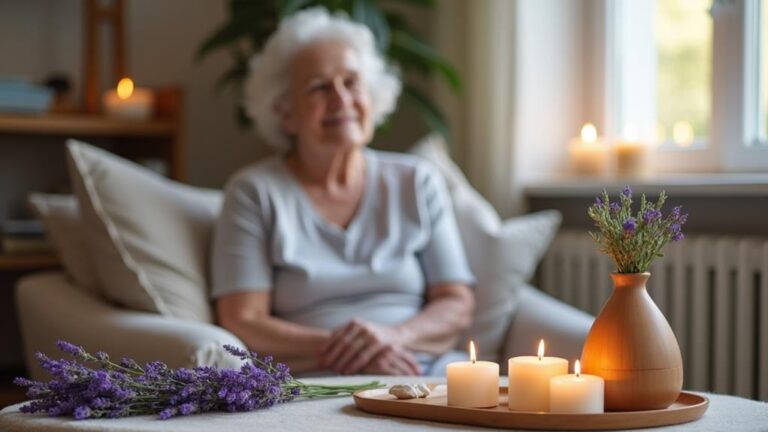As you navigate the challenges of daily life, you're likely no stranger to anxiety. You've probably tried various methods to calm your nerves, but have you considered harnessing the power of your sense of smell? Aromatherapy, which involves inhaling essential oils, has been touted as a natural anxiety-reducer. But does it really work? You might be surprised to learn that certain scents, such as lavender and bergamot, have been shown to have a profound impact on your nervous system. But how do they do it, and which oils are most effective?
Key Takeaways
- Aromatherapy can reduce anxiety by sending calming signals directly to the brain through the sense of smell, influencing mood and emotions.
- Certain essential oils like lavender, bergamot, and ylang-ylang have been shown to promote relaxation, calmness, and anxiety reduction.
- Aromatherapy devices, such as diffusers or inhalers, can deliver calming scents directly to the brain, reducing anxiety in as little as three to five minutes.
- Aromatherapy can be used in conjunction with other therapies to reduce anxiety symptoms, improve sleep quality, and enhance overall well-being.
- While regulation is lacking, peer-reviewed studies and reputable organizations have found aromatherapy to be an effective way to tackle anxiety and promote relaxation.
The Science of Smell
Through the intricate labyrinth of your nasal passages, a subtle yet potent messenger system operates, influencing your emotions, memories, and even your physical well-being.
This complex process is rooted in the science of smell, where odor molecules bind to specialized receptors in your nose, sending signals directly to your brain.
The brain's limbic system, responsible for emotions and memory, is closely linked to this process, which is why smells can evoke powerful emotional responses and vivid memories.
This phenomenon is known as smell memory, where a particular aroma can transport you back to a specific time and place, often accompanied by a strong emotional response.
The brain chemistry involved in this process is intricate, with neurotransmitters like serotonin and dopamine playing key roles in regulating your mood and emotional state.
Essential Oils for Anxiety
You're likely wondering which essential oils can help calm your anxiety symptoms.
You'll discover that certain natural mood boosters, such as bergamot and lavender, can promote relaxation and reduce anxiety.
Calming Anxiety Symptoms
Calming anxiety symptoms often becomes a daily struggle for many individuals, and essential oils can provide a valuable natural solution to alleviate these feelings of unease.
You may find yourself constantly on edge, worrying about potential anxiety triggers that can spark panic attacks. In such situations, incorporating essential oils into your daily routine can be a game-changer.
Certain oils, such as lavender and bergamot, have a profound impact on your emotional state, promoting relaxation and reducing anxiety symptoms. When inhaled, these oils interact with your brain's limbic system, calming your mind and body.
By using essential oils, you can better manage anxiety triggers and reduce the frequency of panic attacks. For instance, you can add a few drops of lavender oil to your pillow or inhale bergamot oil when you feel anxious.
Natural Mood Boosters
Many essential oils possess natural mood-boosting properties, making them an excellent addition to your anxiety-relief arsenal.
As you explore the world of aromatherapy, you'll discover that certain essential oils can uplift and calm your mind and body.
- Bergamot: Known for its citrusy scent, bergamot essential oil has a profound impact on anxiety. It reduces stress and anxiety by promoting relaxation and calmness.
- Ylang-ylang: This sweet, floral oil has a soothing effect on the nervous system, helping to calm anxiety and stress. It also promotes feelings of self-love and self-worth.
- Geranium: With its subtle, floral aroma, geranium essential oil balances the emotions, reducing anxiety and stress. It's often used in herbal teas and plant medicine to promote relaxation.
When used in conjunction with other anxiety-reducing techniques, these essential oils can be a powerful tool in managing your anxiety.
Relaxing Essential Blends
During moments of heightened anxiety, finding the right essential oil blend can be a game-changer. You'll want to look for relaxing essential blends that promote emotional balance and calmness.
One popular option is a calming blend of lavender, chamomile, and bergamot, which can help quiet your mind and soothe your nervous system. Another option is a grounding blend of cedarwood, sandalwood, and ylang-ylang, which can help you feel more centered and calm.
When using essential oils for anxiety, you can incorporate them into your daily routine in various ways. Take an aromatic bath by adding a few drops of your chosen blend to warm water, and let the calming scents envelop you.
You can also diffuse the oils in the air, or apply them topically to your pulse points after diluting them with a carrier oil. Remember to always follow proper safety guidelines and dilution ratios when using essential oils.
How Aromatherapy Works
As you explore the world of aromatherapy, you'll discover that it relies on the powerful connection between your sense of smell and your brain.
When you inhale essential oils, the molecules travel up your nostrils and bind to olfactory receptors, sending signals directly to your limbic system, which processes emotions and memories. This direct route allows aromatherapy to influence your mood, emotions, and even physical responses.
An aromatherapist plays a vital role in harnessing this power by selecting specific essential oils and blends to address your unique needs. They may use various methods, including:
- Topical application: applying oils to the skin through massage, creams, or lotions.
- Inhalation: breathing in oils through a diffuser, inhaler, or direct inhalation.
- Environmental exposure: using oils in a room spray, bath, or sauna to create a therapeutic atmosphere.
Lavender Oil for Anxiety Relief
By virtue of its calming properties, lavender oil has earned a reputation as a natural anxiety reliever, and for good reason. With a rich history dating back to ancient civilizations, lavender has been used for centuries to promote relaxation and reduce anxiety.
In modern times, lavender therapy has become a popular form of aromatherapy, where the essential oil is inhaled to stimulate the brain's limbic system, which regulates emotions and mood.
When you inhale lavender oil, its calming effects can help slow down your heart rate, lower your blood pressure, and reduce feelings of anxiety and stress. Studies have shown that lavender oil can also improve sleep quality, which is often disrupted in individuals with anxiety disorders.
Additionally, lavender oil has been shown to reduce anxiety in individuals undergoing medical procedures, such as surgery or dental work. As a natural and non-invasive therapy, lavender oil is a great option for you to think about if you're looking for a natural way to manage your anxiety.
Peppermint Oil for Stress Reduction
When you inhale peppermint oil, you can expect a calming effect on your brain, which helps to reduce anxiety and stress.
This invigorating scent also helps to increase oxygen flow to the brain, reducing mental fatigue and boosting your focus.
Calming Effects on Brain
One of the most significant ways peppermint oil can alleviate anxiety is by exerting a calming effect on the brain.
When you inhale peppermint oil, it interacts with your brain chemistry, influencing neuro responses that contribute to feelings of anxiety.
This calming effect can be attributed to the oil's ability to:
- Reduce cortisol levels: Peppermint oil has been shown to decrease cortisol levels, a hormone associated with stress and anxiety.
- Activate GABA receptors: GABA (gamma-aminobutyric acid) is a neurotransmitter that helps regulate calmness and relaxation. Peppermint oil activates these receptors, promoting a sense of calm.
- Alter brain wave activity: Peppermint oil has been found to alter brain wave activity, shifting from beta waves (associated with anxiety) to alpha waves (associated with relaxation).
Reduces Mental Fatigue
Peppermint oil's anxiety-alleviating effects extend beyond calming the brain, as it also plays a significant role in reducing mental fatigue. When you're overwhelmed by anxiety, it's common to experience mental exhaustion, making it challenging to focus and make decisions.
Peppermint oil can help you regain your mental energy and combat anxiety burnout. By inhaling peppermint oil, you stimulate your mind and body, promoting mental recovery. This, in turn, helps you tackle tasks more efficiently, reducing feelings of anxiety and stress.
As you incorporate peppermint oil into your daily routine, you'll notice a significant improvement in your mental clarity and focus. You'll be more productive, and your mental fatigue will start to dissipate.
This is especially important for individuals who experience chronic anxiety, as it can lead to anxiety burnout if left unchecked. By reducing mental fatigue, peppermint oil helps you regain control over your mental well-being, enabling you to tackle anxiety head-on.
With regular use, you'll find that you're more resilient to anxiety's debilitating effects, and you'll be better equipped to manage stress and anxiety in the long run.
Inhaling Anxiety Away
[TEXT]:
Three to five minutes of focused inhalation can be all it takes to shift your anxiety response.
When you're feeling anxious, your body is in a state of hyperarousal, and your senses are on high alert. By targeting your sense of smell, aromatherapy can help calm your nervous system and reduce anxiety triggers.
Using aromatherapy devices, such as essential oil diffusers or inhalers, can be an effective way to deliver calming scents directly to your brain.
Here's how you can inhale anxiety away:
- Identify your anxiety triggers: Understanding what causes your anxiety can help you prepare for anxious situations and respond more effectively.
- Choose a calming scent: Select an essential oil that promotes relaxation, such as lavender or bergamot, and use it in your aromatherapy device.
- Breathe deeply and focus: Take slow, deep breaths, focusing on the sensation of the scent in your nostrils and the calming effects it has on your body.
Aromatherapy Methods Explained
Exploring the various aromatherapy methods can help you tailor your anxiety-reducing strategy to your unique needs and preferences. You can choose from a range of methods to find what works best for you.
One popular approach is aromatic massage, which combines the benefits of massage therapy with the calming effects of essential oils. This method involves a licensed therapist applying gentle pressure to specific areas of your body while using oils like lavender or chamomile to promote relaxation.
Another method is using scented candles, which can create a calming atmosphere and help you unwind. Simply light the candle and inhale the soothing aroma to calm your mind and body.
You can also use essential oils in a diffuser, apply them topically to your skin, or add them to your bath water. Additionally, you can incorporate aromatherapy into your daily routine through activities like meditation, yoga, or deep breathing exercises.
Real-Life Anxiety Success Stories
Since discovering the calming effects of aromatherapy, many individuals have successfully incorporated it into their anxiety management plans, achieving remarkable results.
You may be wondering if these results are limited to a select few, but the truth is that aromatherapy has helped countless people overcome anxiety naturally.
You can find numerous testimonials from people who've benefited from aromatherapy in anxiety support groups and online forums.
Here are a few examples:
- Reduced anxiety attacks: Sarah, a 35-year-old marketing manager, was experiencing frequent anxiety attacks that disrupted her daily life. After incorporating aromatherapy into her routine, she reported a significant reduction in anxiety attacks and improved overall well-being.
- Improved sleep: John, a 42-year-old entrepreneur, struggled with insomnia due to anxiety. He started using lavender essential oil in his diffuser before bed and noticed a marked improvement in his sleep quality.
- Enhanced mood: Emily, a 28-year-old student, was experiencing anxiety and depression. She began using bergamot essential oil in her aromatherapy sessions and reported a significant improvement in her mood and overall mental health.
These success stories demonstrate the potential of aromatherapy in reducing anxiety and improving overall well-being.
Separating Fact From Fiction
Digging deeper into the world of aromatherapy, you'll likely come across a mix of credible sources and unsubstantiated claims. It's vital to separate fact from fiction to understand the true benefits and limitations of aromatherapy in reducing anxiety.
One critical aspect to take into account is aromatherapy regulation. Unlike pharmaceuticals, essential oils aren't strictly regulated, which means the quality and potency of oils can vary dramatically between brands.
This lack of regulation raises concerns about oil potency, as some oils mightn't contain the advertised concentration of active compounds.
When evaluating the effectiveness of aromatherapy, it's imperative to consult credible sources, such as peer-reviewed studies and reputable organizations. Be wary of anecdotal evidence or claims that seem too good to be true.
Frequently Asked Questions
Can I Use Aromatherapy in Conjunction With Medication for Anxiety?
You can use aromatherapy alongside medication for anxiety, but be cautious of potential aromatherapy interactions with prescription alternatives; consult your doctor to guarantee safe and effective integration of both therapies into your anxiety management plan.
Are Essential Oils Safe for Children and Pregnant Women?
When using essential oils, you must consider their safety for vulnerable groups, like children and pregnant women, as essential oil toxicity and aromatic exposure can be risky; always dilute and consult a healthcare professional before use.
How Long Does It Take to Feel the Anxiety-Reducing Effects?
Wow, you're still breathing? Great, now let's get to the good stuff! With aromatherapy, you can expect to feel anxiety-reducing effects within 15-30 minutes, depending on your unique response to essential oils and ability to identify and manage anxiety triggers – it's not a one-size-fits-all timeline, sorry!
Can I Make My Own Aromatherapy Products at Home?
You can create your own aromatherapy products at home using DIY recipes and aromatherapy kits, which provide essential oils, blending tools, and guidelines, allowing you to customize blends that cater to your specific needs and preferences.
Are There Any Specific Precautions for People With Allergies?
While embracing the calming benefits of aromatherapy, you must acknowledge the darker side: allergy triggers lurk in essential oils. Before diving in, you'll want to do sensitivity testing to guarantee you're not trading anxiety for an allergic reaction.
Conclusion
You've learned how aromatherapy can help reduce anxiety by harnessing the power of scent. Now, take a deep breath and consider this: 75% of emotions are triggered by smell, making aromatherapy a potent tool in the fight against anxiety. By incorporating essential oils into your daily routine, you can tap into this powerful connection and find calm in a chaotic world. Give it a try and discover the anxiety-reducing benefits for yourself.


